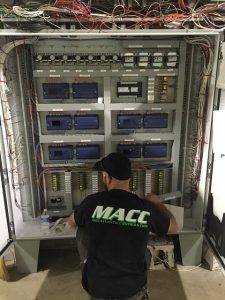Consider the control panel the nerve center or the brain of your BAS. Signals come in and are processed or analyzed. Notifications are sent and decisions are taken and communicated. You expect complete reliability 24/7 plus it should allow expansion, upgrades, and maintenance when needed. This is why control panel fabrication can’t be an afterthought.
Coordinating BAS Complexity

The automated building is more machine than a static structure. There are motors, fans, pumps, lights, actuators, sensors, valves, and locks. These come from a diverse set of vendors and may use different protocols, logic, and voltages. Your BAS networks these disparate components, avoiding redundancy while minimizing operating costs and maximizing occupant well-being, but it can’t do that without a control panel.
BAS Control Panel Fabrication
MACC designs and builds the control panels that make building automation systems work.
For most building operators their control panel priorities are:
- Reliable operation
- Safety and security
- Ease of performing diagnostics and maintenance
- Capacity to add additional functionality
- Flexibility make changes and upgrades
- Footprint (it needs to fit in the space available)
Each of these is addressed in MACC’s control panel fabrication process. This starts with us listening to what our customers want to achieve. Only when requirements are fully understood, documented, and agreed upon can the project be planned.
Layout Design
The first step is to lay out the panel. A particular challenge in designing BAS control panels is that needs change over time. Parts of a building may be repurposed for a different role, occupant work patterns may change, and new technology will almost certainly become available.
No building manager or facility operator wants to throw out a control panel because it can’t be adapted for new requirements, so we anticipate what might be needed and design accordingly.
Footprint is often a limitation in many buildings, especially those being renovated or upgraded. Then there are questions like how will each device or component communicate? What IO will it need? How much power will it draw and how much heat will it put out? These are just some of the factors our engineers work through in laying out a control panel and selecting an enclosure.
Device Procurement
We carry a wide variety of components in inventory but more specialized panels or those with unusual requirements often need devices purchasing. Our procurement professionals take care of this, negotiating prices and ensuring lead times fit within the project plan.
Fabrication & Assembly
Our panel builders are highly experienced and very professional. They follow the drawings and project plan, using industry best practices consistently. Appropriate color schemes and coding conventions are followed and wires clearly marked and correctly terminated.
Pre-Installation Testing
No BAS control panel leaves our facility until we know it works exactly as required. That’s why each one is first inspected and then tested. This ensures that when it reaches the site, installation and integration happens quickly and painlessly.
Documentation
The chances that a BAS control panel will be left unchanged for the life of the system are very low. That’s why part of the MACC approach is to produce detailed documentation of every aspect of the panel.
Wiring diagrams, parts lists, and operating instructions are all developed and delivered to the building operator to ensure ongoing support and sustainability.
Customer Testimonials
Supporting Building Automation Engineering With Expert Control Panel Fabrication
The control panel pulls together the diverse components of a BAS and makes it all work. Only careful attention to design and skilled panel fabrication can ensure high reliability along with ease of upkeep and capacity for expansion or upgrades.
At MACC we understand the importance of your project. Every component, including the control panel, needs to come together and perform exactly as you expect, on time and to budget. Experienced BAS engineering from MACC can achieve this goal.















